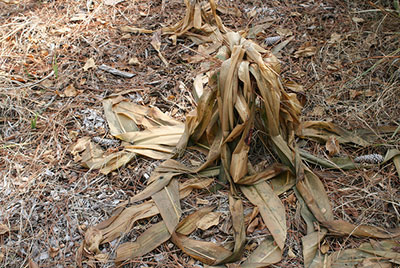Dealing with Heavy Rains
Rain brings needed moisture but can also cause problems in the landscape.

Florida is known for its sudden downpours, especially in the summertime.
Heavy rains can damage tender plants, wash away mulch, and erode soil from around plant roots. Injured or dead plant parts should be pruned immediately after a storm to allow the plant to recover.
Too much rain, combined with our warm summer temperatures, creates an ideal environment for bacterial and fungal problems.
Monitor your plants for signs of disease — spots or other discoloration on foliage, as well as rotting or wilting of stems, fruit, or even the whole plant. Black spot on roses and powdery mildew on a wide range of plants can become a problem after weeks of rain. Turfgrass is susceptible to fungal problems like leaf spot and take-all root rot.
If the soil is really saturated after a heavy rain and you’re worried about root rot, help the soil dry out by removing the mulch from around plantings for a few weeks. Take care not to walk on the muddy, wet soil near your plants — this increases compaction, which can in turn hurt plant roots.
Since we can’t control the weather, the best we can do is be proactive, keeping an eye out for problems. Keep fallen leaves and other debris clear to avoid spreading disease. Make sure plants are dry before pruning, as disease can spread easily in water. Wait to fertilize until next season. Fertilizer won’t help your plants recover any faster, and the next heavy rain will wash it right off and into the nearest water body.
Take a good look at your landscape. Are there areas that stay especially wet, even puddling? Consider a planting a rain garden with plants that can handle both wet and dry spells. If drainage is an issue for your soil type, you might want to plant in raised beds. In many parts of Florida, sinkholes are a concern, and heavy rains can show signs of potential sinkholes. Look for fresh exposure or slumping on fence posts, foundations, or trees that result when the ground sinks. Another potential sign is called ponding, when small ponds of rainfall form where water had not collected before. Read more about sinkholes at the Florida Department of Environmental Protection’s website.
